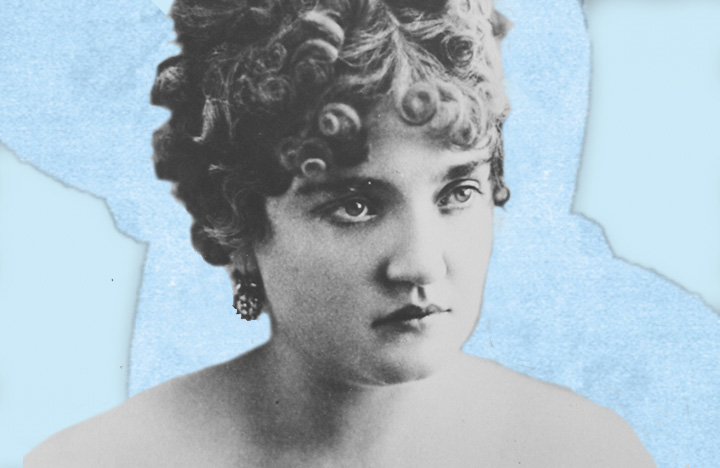Elizabeth “Baby Doe” Tabor
Inductee Name
Elizabeth “Baby Doe” Tabor
Place of Birth
Wisconsin
Date of Birth
1854 – 1935
Year Inducted
1985
Category
Business
Sponsor
Florence Phillips
Impact
Colorado
Baby Doe Tabor, born Elizabeth McCourt in Oshkosh, Wisconsin, was the fifth child in a line of fourteen children. Her father was a successful clothing store owner and civic figure in Oshkosh, but a succession of fires that wiped out his stores eventually depleted his wealth.
She was closest to her older brother James, whom she most nearly resembled and who first called her “Babe” or “Baby”. She had a full social calendar, and rarely mentioned girl friends, but recorded extravagant compliments from admiring beaux, and wrote of her conquests. She was vital, with a strong constitution, charm and astuteness but with possessing a creamy complexion and striking beauty, displayed flirty behavior and vanity.
She first met William Harvey Doe, Jr. on the street and set her cap for him. Despite his mother’s fierce opposition, Baby Doe and William were married June 17, 1877. She was twenty-two and he was one year older. They moved to Central City where he managed the Waterman Mine, a wedding gift from his father.
Eventually, there was trouble at the mine and William was forced to work as a laborer at another mine, but was fired. He was seen frequenting town saloons. The Does moved to Black Hawk into smaller and cheaper housing. William mortgaged the couple’s assets when bills came due. It was rumored that William vanished when Elizabeth gave birth to their stillborn son. She and a friend Jake Sands, a kind admirer, suggested she move to Leadville with him and go into business in his new clothing store.
After learning William moved back to Denver, she went to get a divorce from him in March of 1880. She proceeded to move to Leadville. Topping 10,000 feet in elevation, the city is surrounded by Mounts Massive and Elbert. Leadville was called Cloud City. By 1880 it was Colorado’s second largest city. Banks, hotels, newspapers and of course saloons filled the town. Half the men in town were in mining.
As Elizabeth explored the town, she learned about Leadville’s former mayor and most favored son, Horace Tabor. The more she heard, the more she wanted to know. He and his wife Augusta and come to California Gulch, near Leadville in 1860 when it was a gold camp and returned in 1868 at the start of the silver boom. Wherever they lived, the Tabors ran a miner’s store.
Horace was lucky at poker and even more so at mining. He acquired the Little Pittsburg mine that paid up to $10,000 a day. Later he sold that mine and bought a fleet of investments, including the Chrysolite and Matchless mines plus real estate, adding up to a $9 million dollar fortune. He established the Bank of Leadville and helped build an opera house and hotel.
Baby Doe had heard talk about Augusta, a prim and sharp-tongued New Englander who carped at her husband over the smallest of extravagance. One evening when she was waiting in the Clarendon lobby for Jake to finish work, she recognized Bill Bush, former proprietor of the Teller House in Central City. He told her Tabor had come to Leadville that evening for the grand opening of the Tabor Opera House. The next thing she knew, she was being introduced to Horace Tabor, and invited to dinner with him and her friend. She maintained she fell in love the minute their eyes met. A charming, outgoing man, he was at the crest of his career. They quickly became acquainted over dinner. He was forty-nine, and she was twenty-five. Soon, he was offering to pay off her debts to her friend Jake. When he moved her to a luxurious suite at the Clarendon, news of the affair spread like fire through both Leadville and Denver. He moved them to the Winsdor hotel upon returning to Denver, and thus tried to end his marriage to Augusta, who resisted the divorce. He procured a one-sided divorce, and Baby Doe and Horace were secretly married in September of 1882, but officially married later in March of 1883. Despite the fact they were legally married, Baby Doe was still shunned by supporters of Augusta, and she never did have a woman friend in Denver society. Even though she was snubbed, she continued to donate office space for the Suffrage cause.
In 1886 Tabor paid $54,000 for a pretentious mansion at Thirteenth and Sherman in Denver. During the silver panic of 1893, however, Tabor’s financial empire collapsed; Horace soon died and she became a penniless widow. She grieved for the remainder of her life, and in 1935 friends found her frozen to death, her feet wrapped in rags, in a shed at the Matchless Mine in which she lived alone.
A kaleidoscope of legends surrounds the second wife of Horace Tabor, “Baby Doe,” whose amazing rags-to-riches-to-rags life story was immortalized in an opera, The Ballad of Baby Doe. Because of her passion for a man who was already married, most of society shunned her. It was for her tenacity and pioneering spirit that she was inducted into the Colorado Women’s Hall of Fame.
From the book “Women of Consequence” by Jeanne Varnell


